|
|
|
Sort Order |
|
|
|
Items / Page
|
|
|
|
|
|
|
| Srl | Item |
| 1 |
ID:
113702
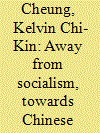

|
|
|
|
|
| Publication |
2012.
|
| Summary/Abstract |
Following the success of China's economic reform in the past few decades, Chinese nationalism has entered a new stage. The sentiment born of 'the century of national humiliation' is insufficient to explain the phenomenon of Chinese new nationalism. In this new era, China no longer regards the West as the benchmark against which it defines its success, but is becoming more assertive about its own values and perspectives. This emphasis on a Chinese perspective is related to the cultural shift in China's post-socialist transition, where the source of legitimacy in China's development has moved from an ideological dimension of socialism to a cultural dimension of 'Chinese characteristics'. Following this transition, growing importance is being placed on an indigenous voice in many aspects of China's development, including the recent efforts to reinvent traditional Chinese culture as a source of China's soft power. In particular, with strong state sponsorship, Confucianism is being revived as a new nationalist discourse, which not only provides new discursive resources for continuing authoritarianism in mainland China, but also redefines governance and nation-building with respect to Hong Kong and Taiwan.
|
|
|
|
|
|
|
|
|
|
|
|
|
|
|
|
| 2 |
ID:
113701
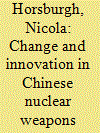

|
|
|
|
|
| Publication |
2012.
|
| Summary/Abstract |
This article explores change and conceptual innovation in Chinese nuclear weapons strategy. It argues that drastic change towards a war-fighting strategy is not considered likely. Some transition is underway, towards what some have termed assured retaliation, but this transition is not a dramatic departure from past strategy which was based on uncertain retaliation. To illustrate this view, the article focuses on three areas: declaratory nuclear policy, military modernization, and academic discussions among military and civilian strategists in China. Declaratory policy offers a useful lens through which to consider Chinese nuclear strategy, especially nuclear deterrence and the policy of no first use. For its part, China's ongoing military modernization has been a source of much concern in the West, but here a distinction is made between nuclear and non-nuclear modernization, and emphasis is placed on how both underpin no first use. Lastly, in Chinese academic circles, discussions have expanded upon declaratory policy and introduced innovative ideas on how best to shape future strategy. These discussions represent important efforts to demystify misconceptions regarding Chinese strategy, moving beyond traditional frameworks of analysis such as minimum deterrence, towards concepts such as counter-coercion.
|
|
|
|
|
|
|
|
|
|
|
|
|
|
|
|
| 3 |
ID:
113698
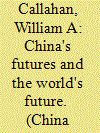

|
|
|
|
|
| Publication |
2012.
|
| Summary/Abstract |
China's growing economic, political, and cultural power is an important global issue; Chinese people are increasingly interested in thinking about their country's future as a world power. This article introduces the special issue 'China's futures - and the world's future' by discussing how futurology works in China. It argues that Chinese futures studies exhibit two general trends: (1) a shift from locating the future outside China to see China itself as the future, and (2) a shift from officials centrally planning the future to many different people dreaming about many different futures. The battle for the future thus is not necessarily between China and the West, but also takes place within the People's Republic of China amongst different groups of Chinese intellectuals. This Introduction examines themes that unite the special issue's diverse set of articles, especially the interplay between technical and cultural innovation. Studying the future here is important not because the forecasts are 'true'; more importantly, Chinese discussions of the future can tell us about how people in the PRC interact with their own past-present-future, and how they interact with people in other countries in the present.
|
|
|
|
|
|
|
|
|
|
|
|
|
|
|
|
| 4 |
ID:
113700
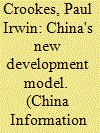

|
|
|
|
|
| Publication |
2012.
|
| Summary/Abstract |
This article examines China's innovation strategy as a key part of its economic development policy to achieve the next stage of the country's domestic market modernization. The news that China now possesses the world's fastest supercomputer appears to confirm the country's inexorable journey from the world's manufacturer and assembly hub to leading global innovator. However, this article presents an examination of broader-based innovation metrics which casts a different light on China's position, showing that much work still remains to be done in order to lift domestic innovative activity to world-class levels. The country is certainly a challenger, but does not yet appear to have become a leader. The article draws on the latest research data of China's innovative capabilities and links these to empirical assessments of the country's information and communications technology sector to illustrate current strengths and weaknesses. In conclusion, it is argued that key inhibitors remain in the context of creating commercially sustainable competitive advantage in science and technology, and that the strengthening of moves towards nationalist innovation strategies may be counterproductive as China embarks on a critical phase of its engagement with the global research and development community.
|
|
|
|
|
|
|
|
|
|
|
|
|
|
|
|
| 5 |
ID:
113699
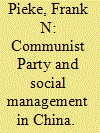

|
|
|
|
|
| Publication |
2012.
|
| Summary/Abstract |
At the core of China's rise lies the Chinese Communist Party's ability to reinvent itself and its administration. This article investigates one aspect of the gradual overhaul of administrative institutions, processes, and strategies, namely the increasing prominence of neoliberal ideas emanating from the discipline of public management in the recent emphasis on 'social management' (????) in government rhetoric and action. The article concludes that social management may ultimately entail a corporatist re-engineering of Chinese society that allows a considerable degree of pluralism while strengthening the leading role of the Party over society.
|
|
|
|
|
|
|
|
|
|
|
|
|
|
|
|
| 6 |
ID:
113705
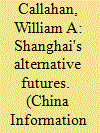

|
|
|
|
|
| Publication |
2012.
|
| Summary/Abstract |
Civil society seems to be a dead issue in China because its formal aspects of mobilization and institutionalization are so tightly regulated by the party-state. This article looks to activities in and around the Shanghai World Expo (2010) to rethink the meaning of civil society and political action in China. Through an analysis of the Expo's national, theme, and corporate pavilions, it shows how Beijing is planning a harmonious future for China and the world. Yet alongside this unified future, it examines how Shanghai's citizen intellectuals - filmmaker Jia Zhangke, artist Cai Guoqiang, and blogger Han Han - are creating alternative futures. This multiple decentralized view of the future is an integral part of building alternative notions of civil society in China. The article thus has two goals: (1) to contrast official constructions of a unified harmonious future with citizen intellectuals' multilayered views of Shanghai's past-present-future; and (2) to explore how citizen intellectuals are creating a new civil society that can build alternative futures.
|
|
|
|
|
|
|
|
|
|
|
|
|
|
|
|
| 7 |
ID:
113704
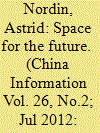

|
|
|
|
|
| Publication |
2012.
|
| Summary/Abstract |
China's modernization and rise is commonly understood as a key factor that will shape future world order. This article examines narratives at Expo 2010 Shanghai China as an instance of the local constitution of this future world. Such imaginations of China and/in the world actively create the future, through assumptions about time and space that structure the possible imaginations of China, the World, and their interrelation. This article examines how the technological and conceptual innovations that play out at the Expo draw on two common cosmologies, the 'unit-based' cosmology of the international state system and a Chinese 'holistic' imaginary of tianxia (all-under-heaven). It shows how these two cosmologies order universal/particular, time/space, and self/other through Beijing's 'harmonious world' policy. It argues that the two cosmologies are not mutually exclusive, but are deployed at the Expo in ways that reinforce one another by ordering spatial difference through teleological time. The effect is a story of China and the World where others are not different; they are just behind. This is a problem because the reduction of spatial difference to place in a historical queue makes it difficult to imagine plural futures, as opposed to The Future already inscribed in the story.
|
|
|
|
|
|
|
|
|
|
|
|
|
|
|
|
| 8 |
ID:
113703
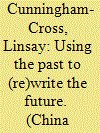

|
|
|
|
|
| Publication |
2012.
|
| Summary/Abstract |
To many in China, their country's rise is not simply a hard power phenomenon; China's new weight in international affairs demands that it also innovates culturally to offer new global norms to the world. Thus in recent years many prominent Chinese scholars have invested significant time and resources into searching for, or attempting to define, a distinctly Chinese approach to theorizing international relations. One of the potential sources often cited as a foundation for such an approach is China's long and rich history of political theorizing and political/cultural leadership. This article considers one of the key contributions to that debate from a Tsinghua University scholar, Yan Xuetong. Despite his rejection of the 'China school' project, Yan has invested significant resources in a project that seeks to apply pre-Qin thought to contemporary international politics. Through a careful reading of this work, the article reveals a compelling narrative about China's future rise. It argues that through discursively linking pre-Qin classical texts with China's modern rise, Yan Xuetong is using China's past to write its, and the world's, future. The article critically engages with this future Yan is narrating, and considers some of the implications it might have for China and the world.
|
|
|
|
|
|
|
|
|
|
|
|
|
|
|
|
|
|
|
|
|